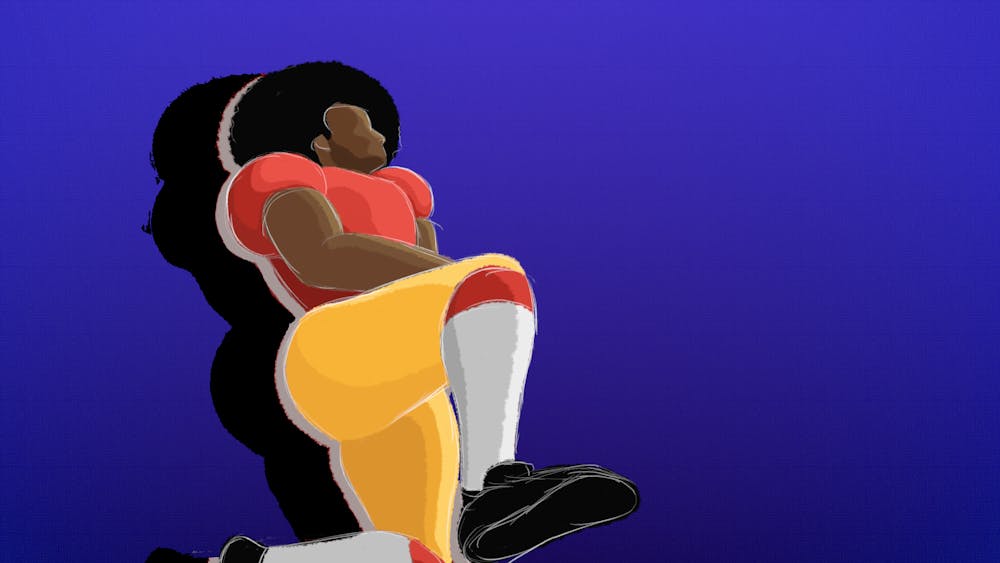In the past few years, Rihanna has done a lot. She successfully built a fashion empire, became a mother, and landed a spot on the Forbes billionaires list. Surprisingly, though, she hasn’t released a studio album or performed live in over five years. After so much time spent off the grid in the music world, her announcement that she would headline the Super Bowl LVII halftime show sent her fanbase into a frenzy. But among the excitement regarding Rihanna’s return to the stage, we must take a closer look at the event she’s playing and what this means for the Black community in America.
In an NFL preseason game in 2016, the world watched with wide eyes when San Francisco 49ers quarterback Colin Kaepernick remained sitting on the bench while the rest of the stadium stood for the national anthem. This marked the beginning of a nationwide protest that would last for years: Athletes in all different sports and competing at all different levels kneeled during the anthem in protest of the treatment of Black Americans in the United States. With police brutality and the killings of Black Americans rampant, Kaepernick stated that “[he is] not going to stand up to show pride in a flag for a country that oppresses Black people and people of color.” Due to rising volatility and criticism from the NFL, Kaepernick chose to leave the 49ers and seek a spot on a new team. But despite his great credentials, Kaepernick was never offered another NFL contract.
News of the Kaepernick situation came to a climax in the months before Super Bowl LIII. After many tribulations, Maroon 5 was reported to be the headliners for the controversial halftime show. Immediately, a change.org petition calling for the group to drop out of the halftime show garnered over 100,000 signatures. Maroon 5, desperate for an artist of color to join them onstage, reached out to “more than a half–dozen stars,” including André 3000, Mary J. Blige, Usher, Lauryn Hill, and Nicki Minaj. But, as reported by Variety, everyone said no. Cardi B, the most obvious choice (due to her collaboration with Maroon 5), declined the offer, asserting that she was standing in solidarity with Kaepernick. Other celebrities sided with Kaepernick, too. Comedian Amy Schumer, who has frequented Super Bowl commercials in the past, noted that she would refuse to appear in any Super Bowl LIII commercials and said, “I think it would be cool if [Maroon 5] backed out of the Super Bowl. I know opposing the NFL is … very tough, but don’t you want to be proud of how you’re living?”
Most notably, Rihanna was the first act asked to perform at Super Bowl LIII and the first to decline. When asked if she had turned down the offer in support of Kapernick, Rihanna responded, “Absolutely. I couldn’t dare do that. For what? Who gains from that? Not my people. I just couldn’t be a sellout. I couldn’t be an enabler.” Rihanna’s rejection of the NFL set the stage for several artists to stand in support of Kaepernick and disassociate from the NFL as well.
Rihanna’s disapproval of the NFL is also reflected in her record label, Roc Nation. Founded by Grammy–winning rapper and activist Jay–Z, Roc Nation has a testy history with the NFL. Jay–Z himself rapped, “I said no to the Super Bowl: You need me, I don’t need you. Every night we in the end zone. Tell the NFL we in stadiums, too,” in his hit song “APESHIT” with Beyoncé. Jay–Z also claims to have talked Travis Scott out of performing in the LIII halftime show and wore a Kaepernick jersey on a Saturday Night Live appearance.
Taking into account this recent history, it’s hard to understand why Rihanna is so eager to headline the same event she so vehemently declined years earlier. Unfortunately, Rihanna’s decision to star in this year’s halftime show is a stabbing reminder of America’s choice to have “moved past kneeling” (as said by Jay–Z) and put the Black Lives Matter movement on the backburner.
The George Floyd Justice in Policing Act, a bill seeking to reform racial bias and use of force in policing, stalled in U.S. Congress. Despite the attention generated by Floyd’s death in 2020, new data reports the number of Black people killed by police has actually increased over the last two years. In the wake of Black History Month, it seems that the Black Lives Matter movement was just a trend that’s slowly dying out. Nothing has changed.
After the chaos of Super Bowl LIII winded down, Roc Nation has since changed its tune and partnered with the NFL in 2019. This deal states that “Roc Nation will advise on the selection of artists for major NFL performances like the Super Bowl.” Now, Rihanna’s debut performance being a Super Bowl headliner comes full circle. Roc Nation and Rihanna’s support of the NFL is a hypocritical, money–making scheme that undermines the entire reason why Kaepernick kneeled in the first place.
So, while we can be excited to witness Rihanna’s great return, we must never forget Kaepernick’s courage to speak out. He sacrificed his job to make sure we heard of America’s issues of racial injustices, but did we really listen?

